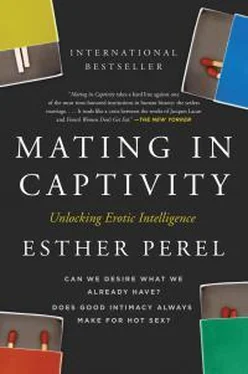The magic elixir that’s meant to make this possible is intimacy. We’ll get to the bottom of this by looking through various lenses, but here it’s worth pointing out that the stereotype of women as entirely romantic and men as sexual conquistadors should have been dispelled a long time ago. The same goes for any ideas that cast women as longing for love, essentially faithful, and domestically inclined, and men as biologically non-monogamous and fearful of intimacy. As a result of social and economic changes that have occurred in recent western history, traditional gender lines have been circumvented, and these qualities are now seen in both men and women. While stereotypes can hold considerable truth, they fall short of capturing the complexities of contemporary relationships. I seek a more androgynous approach to love.
As a couples therapist, I have inverted the usual therapeutic priorities. In my field we are taught to inquire about the state of the union first and then ask how this is manifested in the bedroom. Seen this way, the sexual relationship is a metaphor for the overall relationship. The underlying assumption is that if we can improve the relationship, the sex will follow. But in my experience, this is often not the case.
Traditionally, the therapeutic culture has favored the spoken word over the expressiveness of the body. Yet sexuality and emotional intimacy are two separate languages. I would like to restore the body to its rightful prominent place in discussions about couples and eroticism. The body often contains emotional truths that words can too easily gloss over. The very dynamics that are a source of conflict in a relationship—particularly those pertaining to power, control, dependency, and vulnerability—often become desirable when experienced through the body and eroticized. Sex becomes both a way to illuminate conflicts and confusion around intimacy and desire and a way to begin to heal these destructive splits. Each partner’s body, imprinted as it is with the individual’s history and the culture’s admonitions, becomes a text to be read by all of us together.
In keeping with the theme of reading, this is as good a time as any to explain some terms you’ll encounter in this book. For clarity, I will use the word “marriage” to refer to long-term emotional commitments, not just to a legal status. And I sometimes like to move freely between male and female pronouns without necessarily heaping judgment on either gender.
I myself, as my name gives away, am of the female persuasion. Less obvious, perhaps, is that I’m a cultural hybrid. I live on many shores, and I want to bring an informed cultural view—or multicultural view—to the topic of this book. I grew up in Belgium, studied in Israel, and finished my training in the United States. Shuttling between various cultures for more than thirty years, I have formed the perspective of someone who is comfortable watching from the sidelines. This vantage point has provided me with multiple perspectives for my observations on how we develop sexually, how we connect to one another, how we narrate love, and how we engage in the pleasures of the body.
I’ve transferred my personal experience to my professional work as a clinician, teacher, and consultant working in cross-cultural psychology. Having focused on cultural transition, I’ve specifically worked with three populations: refugee families and international families (the two groups that move most these days, albeit for very different reasons) and intercultural couples (which include interracial and interfaith pairings). For intercultural couples, the cultural shifts do not stem from a geographic move, but instead take place in their own living rooms. What really piqued my interest was how this merging of cultures influenced gender relations and child-rearing practices. I pondered the many meanings of marriage, and how its role and its place in the larger family system varies in different national contexts. Is it a private act of two individuals or a communal affair between two families? In my sessions with couples, I tried to discern the cultural nuances behind the discussion of commitment, intimacy, pleasure, orgasm, and the body. Love may be universal, but its constructions in each culture are defined, both literally and figuratively, in different languages. I was particularly sensitive to the conversations about child and adolescent sexuality because it is in messages to children that societies most reveals their values, goals, incentives, prohibitions.
I speak eight languages. Some I learned at home, some at school, a few during my travels, and one or two through love. In my practice, I am called on to use my multicultural proficiency as well as my skill as a polyglot. My patients are straight and gay (I don’t work with the transgender population at this time), married, committed, single, and remarried. They are young, old, and in between. They cover a wide spectrum of cultures, race, and class. Their individual stories highlight the cultural and psychological forces that shape how we love and how we desire.
One of my most formative personal experiences underlying this book may seem circuitous, but I must reveal it to you, as it sheds a light on the deeper motivations that fuel my passion. My parents were survivors of Nazi concentration camps. For a number of years, they stood face-to-face with death every day. My mother and father were the sole survivors of their respective families. They came out of this experience wanting to charge at life with a vengeance and to make the most of each day. They both felt that they had been granted a unique gift: living life again. My parents were unusual, I think. They didn’t just want to survive; they wanted to revive. They possessed a thirst for life, thrived on exuberant experiences, and loved to have a good time. They cultivated pleasure. I know absolutely nothing about their sexual life except that they had two children, my brother and me. But by the way they lived, I sensed that they had a deep understanding of eroticism. Though I doubt that they ever used this word, they embodied its mystical meaning as a quality of aliveness, a pathway to freedom—not just the narrow definition of sex that modernity has assigned to it. It is this expanded understanding that I bring to bear on my discussion of eroticism in this book.
There is yet another powerful influence that has helped shape this project. My husband is the director of the International Trauma Studies Program at Columbia University. His work is devoted to assisting refugees, children of war, and victims of torture as they seek to overcome the massive trauma they’ve experienced. By restoring their sense of creativity and their capacity for play and pleasure, these survivors are ultimately helped to reconnect with life and the hope that fuels it. My husband deals with pain; I deal with pleasure. They are intimately acquainted.
The individuals I write about do not appear in the acknowledgments, though I owe them a great deal. Their stories are authentic and almost verbatim, but their identities are masked. Throughout this project, I’ve shared excerpts with them in the spirit of collaboration. Many of my ideas were developed through my work, and not the other way around. My ideas also draw on the wealth of careful considerations made by many professionals and authors who have previously tackled the ambiguities of love and desire.
Every day in my work I am confronted with the detailed realities that hide behind statistics. I see people who are such good friends that they cannot sustain being lovers. I see lovers who hold so tenaciously to the idea that sex must be spontaneous that they never have it at all. I see couples who view seduction as too much work, something they shouldn’t have to do now that they’re committed. I see others who believe that intimacy means knowing everything about each other. They abdicate any sense of separateness, then are left wondering where the mystery has gone. I see wives who would rather carry the label “low sexual desire” for the rest of their lives than suffer explaining to their husbands that foreplay needs to be more than a prelude to the real thing. I see people so desperate to beat back a feeling of deadness in their partnerships that they’re willing to risk everything for a few moments of forbidden excitement with someone else. I see couples whose sex lives are rekindled by an affair, and others for whom an affair effectively ends what little connection remained. I see older men who feel betrayed by their newly unresponsive penises, who rush for Viagra to soften the anxiety of the hard facts; I see their wives made uncomfortable by the sudden challenge to their own passivity. I see new parents whose erotic energy has been sapped by caring for an infant—so consumed by their child that they don’t remember to close the bedroom door once in a while. I see the man who looks at porn online not because he doesn’t find his wife attractive but because her lack of enthusiasm leaves him feeling that there’s something wrong with him for wanting sex. I see people so ashamed of their sexuality that they spare the one they love the ordeal. I see people who know they are loved, but who long to be desired. They all come to see me because they yearn for erotic vitality. Sometimes they come sheepishly; sometimes they arrive desperate, dejected, enraged. They don’t just miss sex, the act; they miss the feeling of connection, playfulness, and renewal that sex allows them. I invite you to join me in my conversations with these questers as we work toward opening up and coming a step closer to transcendence.
Читать дальше










